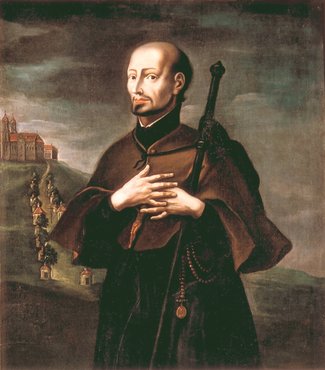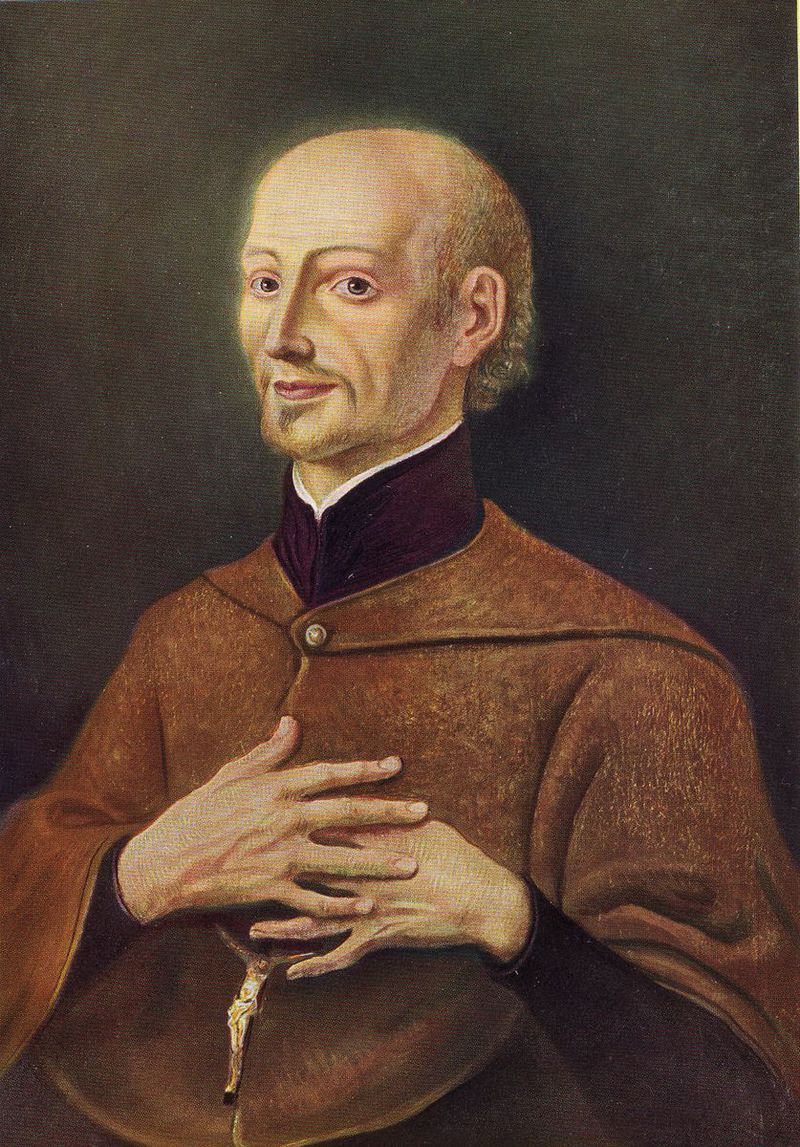Venerable Philip Jeningen, SJ
Born: January 5, 1642
Died: February 8, 1704
 Philip Jeningen, the second son of the town’s mayor, was born in Eichstatt (modern day Bavaria), Germany. He attended the Jesuit school in his native city at the age of sixteen wanting to be a Jesuit. But because of parental opposition, he only became one, five years later in 1663 after completing his master’s degree at the University of Ingolstadt. He entered the Society at Landsberg and was ordained on June 11, 1672.
Philip Jeningen, the second son of the town’s mayor, was born in Eichstatt (modern day Bavaria), Germany. He attended the Jesuit school in his native city at the age of sixteen wanting to be a Jesuit. But because of parental opposition, he only became one, five years later in 1663 after completing his master’s degree at the University of Ingolstadt. He entered the Society at Landsberg and was ordained on June 11, 1672.
Fr Jeningen had, during his studies, written to Fr General in Rome requesting permission to serve on the home missions. His requests for the missions became more frequent after he was cured of a grave illness, having prayed to St Francis Xavier. After he completed his Jesuit training, Fr Jeningen was sent to Mindelheim and Dillingen to teach for seven years before going to Ellwangen to give retreats and parish missions. This apostolate, traversing the dioceses of Augsburg, Eichstatt and Wurzburg lasted twenty-four years and was a great success because Fr Jeningen was a living example of what he preached – mortification, prayer and humility.
Fr Jeningen’s main focus during his missions was to bring the lost sheep back to the fold and to inspire lax Catholics to become more fervent. He also visited the sick, the poor and those in prison as well as teaching children and adolescents to know God.
 Fr Jeningen’s religious life was blessed with special graces such as visions and interior revelations which are now known only because his superiors had ordered him to write an autobiographical account of his spiritual life. On Feb 13, 1681, after celebrating Mass and during a time when he was especially depressed because he had to endure persecution and calumny, Jesus and Our Lady appeared to him. Our Lord gave him His right hand and said: “I will show you that I am a father to you,” and Our Lady added: “I will show you I am your mother.” This divine visit restored his confidence and he was able to enjoy inner peace even when confronted by persecution and calumny. On another occasion Our Lord appeared and said to him: “I love you, my dear Philip, and I will love you eternally.”
Fr Jeningen’s religious life was blessed with special graces such as visions and interior revelations which are now known only because his superiors had ordered him to write an autobiographical account of his spiritual life. On Feb 13, 1681, after celebrating Mass and during a time when he was especially depressed because he had to endure persecution and calumny, Jesus and Our Lady appeared to him. Our Lord gave him His right hand and said: “I will show you that I am a father to you,” and Our Lady added: “I will show you I am your mother.” This divine visit restored his confidence and he was able to enjoy inner peace even when confronted by persecution and calumny. On another occasion Our Lord appeared and said to him: “I love you, my dear Philip, and I will love you eternally.”
In 1674, while saying Mass, Fr Jeningen was given a divine revelation that he had but thirty years in which to live and work. In 1694 he had another revelation that he had ten more years left. Then in Jan 1704 while visiting his villages around Ellwangen, he met a farmer who broke into a rage and began blaspheming God. Fr Jeningen tried to calm him down but the more he tried the more enraged the farmer became. Fr Jeningen was so disturbed by this outburst of irreverence that he became ill and he knew this illness would cause his death as he knew he was to die in 1704. To prepare himself to meet the Lord, Fr Jeningen decided to make the Spiritual Exercises of St Ignatius. On the sixth day of the retreat, Jan 28, he became more ill and could barely walk. When he completed his retreat on Jan 30, his strength was gone and he had to be confined to bed. He asked for anointing on Feb 2 and spent the remaining few days prayerfully, in close contact with God. He had no fear of death and his soul was filled with such great peace and joy that he had already begun to participate in the vision of God.
On the morning of Feb 8, 1704, his superiors knew that Fr Jeningen’s death was imminent. As evening approached, Fr Jeningen asked his Jesuit community for forgiveness if he had offended them. He thanked them and asked to be remembered at the altar. Shortly after, the sixty-two-year-old priest surrendered his soul to his beloved Jesus. Great crowds came from the city and surrounding region to the Jesuit residence to pay their respect to Fr Jeningen, as he was greatly loved and respected by all as the “holy man.” He was buried on February 9 in the cloisters attached to the Jesuit church in Ellwangen. Fr Jeningen’s cause was introduced in Rome on March 23, 1945 and the decree confirming his heroic practice of virtue was issued December 21, 1989.
